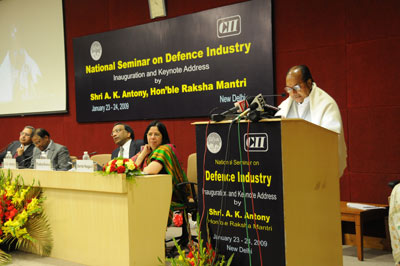You are here
National Seminar on Defence Industry

Concept Note
India has a large defence industrial base, mainly under state control, with limited but a growing private sector contribution. The public sector enterprises consist of 39 Ordnance Factories and eight Defence Public Sector Undertakings. These enterprises some of which date back to pre-colonial period, form the backbone of the India’s defence industry. They produce a variety of variety of items, mostly from technologies developed by the DRDO or obtained through licenses from foreign countries, ranging from small arms to heavy vehicles, tanks, fighter aircrafts, missiles, defence electronics and naval ships among others. Besides, they also provide repair, maintenance and overhaul facilities for both indigenous and imported systems. In 2007-08 these enterprises together produced items worth Rs. 27,479 crores, of which over 80 per cent were sold to the defence forces.
Unlike the established public sector enterprises, until recently the private sector had a very limited role in the field of defence production, by way of supplying raw materials, components and spare parts. Since 2001, role of the private sector has been expanded in a growing acknowledgment to its contribution in the civilian sector, especially in the field of engineering, manufacturing, project management, IT and software. To integrate the private sector in defence industry the government has allowed 100 per cent participation with FDI, permissible up to 26 per cent, though both are subject to prior licensing. Apart from this, to provide a level-playing field to private sector vis-à-vis government controlled enterprises, the MoD, besides revising the Defence Procurement Procedure from time to time, has introduced the concept of Raksha Udyog Ratnas which when operationalised would treat the selected private companies at par with the public sector enterprise. The recently introduced defence offset policy also provides an equal status to the private sector to benefit from increased business opportunities, possible inflows of investment and technologies from overseas and tie-up with major domestic and foreign defence companies.
Despite the existence of the public sector enterprises for a fair amount of time and the entry of private sector since 2001, there still exists a void in India’s core defence industrial capability. This is significant given the country’s arms imports, both in the form of new systems as well as upgrades of old systems, running into US $ 5-6 billion per year. This in turn raises many questions as to how to energise domestic industrial base so as to make India increasingly self-reliant in defence production and maintenance.
The National Seminar on Defence Industry will focus on the larger issues that confront the Indian defence industry. It will bring together the policy makers, Armed Forces, Industry captains, both in public and private sectors and also from abroad, to discuss and debate issues pertaining India’s defence industry and how India can learn and benefit from the experiences of the major developed countries in building up a comprehensive defence manufacturing capabilities. Besides, the seminar will address issues such as creating and sustaining long range defence R&D capabilities in critical defence technologies; challenges of developing comprehensive ancillary supply chain of defence manufacturers: and the strategies required for optimising opportunities in export/offsets/services/outsourcing.
Programme
DAY – ONE (January 23, 2009)
Inauguration: 9.30-10.00 hrs
Keynote Address by Shri AK Antony, Hon’ble Defence Minister
Tea: 10.00-10.30 hrs
Session I: 10.30-12.00 hrs
Historical Survey of Policies and Practices concerning Defence Industrialization in Major Developed Countries
Chair: Shri Pradeep Kumar Secretary, Defence Production, Ministry of Defence
Speakers:
- Dr Rihard A Blitzinger, Senior Fellow, A Rajaratnam School of International Studies, Nanyang Technological University
- Dr Vivek Lal, Vice President ,Boeing India
- Dr A J Prasad. CMD, HBL, Power Systems Ltd
- Mr Mark D. Martin, Senior Advisor, Advisory Services, KPMG, India
Session II: 12.00-13.30 hrs
The Contours and Content of Comprehensive Defence Manufacturing Capabilities
Chair: Shri Shri VK Misra, Distinguished Fellow, IDSA
Speakers:
- Mr Julian Scopes, President, BAE System, India
- Mr Rahul Chaudhary, CEO TATA Power
- Brig K A Hai, CEO, Mahindras
- BEL
Lunch: 13.30-14.30 hrs
Session III: 14.30-16.00 hrs
Creating and Sustaining Long Range Defence R&D Capabilities in Critical Defence Technologies
Chair: Dr Prahladha, CCR&D, Defence Research and Development Organization
Speakers:
- Shri Mukesh Bhargava, L&T
- Ms Navneeta Radhakrishnan, SC ‘F’, DRDO
- Mr P M Telang, Executive Dir, Commercial Vehicles., TATA Motors
- Dr A R Manjunath, Chief Designer (Helicopter), HAL
DAY – TWO (January 24, 2009)
Session IV: 9.30-11.30 hrs
The Challenges of Creating a Comprehensive Ancillary Supply Chain of Defence Manufacturers
Speakers:
- Mr Stefen Billep, Country Head, EADS
- Ordnance Factories
- BEML
- BEL
Tea: 11.30-12.00 hrs
Session V: 12.00-13.45
Short/Medium/Long Term Strategies for Optimizing Opportunities in Exports/Offsets/ Services/Outsourcing
Speakers:
- Amb. Douglas A Hartwich, Chief Exec, Lockheed Martin
- Mr Partha Sarathi Guha Patra, Vice President-Strategic Initiatives & Offset Programs, WIPRO Ltd
- Shri Anil Srikhande, Managing Director- India, Rolls Royce
- IMI
Lunch: 13.45-14.45 hrs
